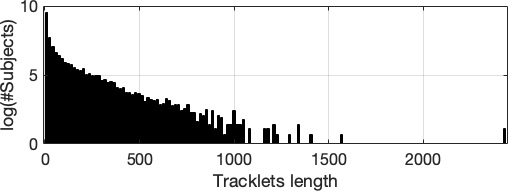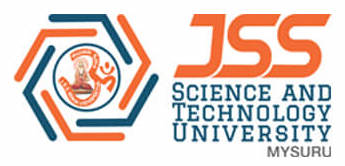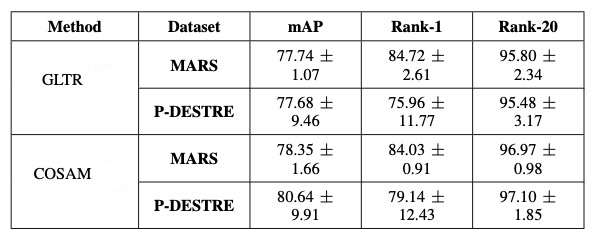|
Home
Dataset/Download
Experiments
About
Contact:
SOCIA Lab. - Soft Computing and
Image Analysis Group
Department
of Computer Science, University of Beira Interior,
6201-001 Covilhã, Portugal
hugomcp@di.ubi.pt
s
|
P-DESTRE
Fully Annotated
Datasets for Pedestrian Detection, Tracking, Re-Identification and Search from Aerial
Devices
Experiments
Here we describe the empirical evaluation protocol
that should be used to provide comparable results in
the P-DESTRE dataset. In
our experiments, to establish a baseline for each
task, 10/5-fold cross-validation schemes were
considered, with data randomly divided into 60%
for learning, 20% for validation and 20% for
testing.
Each
data split used for the: 1) pedestrian detection;
2) pedestrian tracking; 3) pedestrian
re-identification and 4) pedestrian search is
provided below.
Task 1: Pedestrian
Detection
- 10-fold
learning/validation/test splits are available [here]
- Baseline
pedestrian detection scores for RetinaNet
[T1-1] and RFCN
[T1-2] methods, on the PASCAL VOC
2007/2012 and P-DESTRE datasets is
available [here]
The Average Precision values (at Intersection of
Union values equal to 0.5) - AP@IoU=0.5
obtained by both methods are provided in the Table
below. The mean +/- the standard deviation values
are provided.

[T1-1]
T-Y Lin, P. Goyal, R. Girshick, K. He and P. Dollar.
Focal Loss for Dense Object Detection IEEE
Transactions on Pattern Analysis and Machine
Intelligence, 42(2), pag. 318–327, 2020.
[T1-2]
J. Dai, Y. Li, K. He and J. Sun. R-FCN: Object
detection via region- based fully convolutional
networks. In proceedings of the International
Conference on Neural Information Processing Systems,
pag. 379–387, 2016.
Task 2: Pedestrian
Tracking
The sequences of each ID (tracklets) in the P-DESTRE
set have different length, ranging from 4 to 2,467
(average value 63.7 +/- 138.8). The full statistic
of the tracklets length is as follows:

- 10-fold
learning/validation/test splits are available [here]
- Baseline
pedestrian tracking scores for TracktorCv
[T2-1] and V-IOU
[T2-2] methods, on the MOT-17 and P-DESTRE
datasets are available [here]
- Hyper-parameters
specification of both methods is available [here]
The results attained by both algorithms and
datasets are listed in the Table below, provided
in terms of MOTA, MOTP, F-1 performance
measures:
[T2-1] P. Bergmann, T. Meinhardt and L.
Leal-Taixe. Tracking without bells and whistles.
ArXiv, https://arxiv.org/abs/1903.05625v3, 2019.
[T2-2] E. Bochinski, T. Senst and T.
Sikora. Extending IOU based multi-object
tracking by visual information. in Proceedings
of the IEEE International Conference on Advanced
Video and Signal Based Surveillance, doi: 10.
1109/AVSS.2018.8639144, 2018.
Task 3: Pedestrian
Re-Identification
- 5-fold
learning/gallery/query splits are available
[here]
- Baseline
pedestrian re-identification CMC scores for
GLTR
[T3-1] and COSAM
[T3-2] methods, on the MARS and P-DESTRE
datasets are available [here]
The
results attained by both algorithms and
datasets are listed in the Table below,
provided in terms of mean average
precision(mAP) and cumulative rank-1 and 20
values:
[T3-1]
J. Li, J. Wang1, Q. Tian, W. Gao and S.
Zhang. Global-Local Temporal
Representations For Video Person
Re-Identification ArXiv, https://arxiv.
org/abs/1908.10049v1, 2019.
[T3-2] A. Subramaniam, A. Nambiar
and A. Mittal. Co-segmentation Inspired
Attention Networks for Video-based Person
Re-identification. In proceedings of the
International Conference on Computer
Vision, pag. 562- 572, 2019.
Task 4: Pedestrian
Search
- 5-fold
learning/gallery/query splits are available [here]
- Baseline
pedestrian search CMC scores (obtained by
fusing ArcFace [T4-1]
and
COSAM [T4-2]
scores)
on the P-DESTRE dataset are
available [here]
The
results attained are listed in the Table below,
provided in terms of mean average
precision(mAP), and cumulative rank-1 and 20
values:
[T4-1]
J. Deng, J. Guo, N. Xue and S.
Zafeiriou. Arcface: Additive angular
margin loss for deep face recognition.
In proceedings of the IEEE Computer
Society Conference on Computer Vision
and Pattern Recognition,doi:
10.1109/CVPR.2019.00482, 2019
[T4-2] A.
Subramaniam, A. Nambiar and A.
Mittal. Co-segmentation
Inspired Attention Networks
for Video-based Person
Re-identification. In
proceedings of the
International Conference on
Computer Vision, pag. 562-
572, 2019.
|






|
|
|










